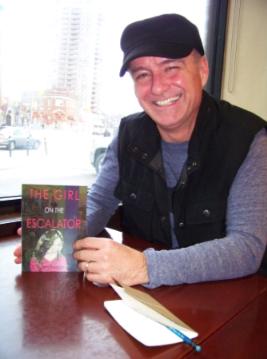Twelve years ago Jim Nason watched his dying partner breathe his last breath.
It changed everything.
“It was a moment of grace to be literally in the bed with him when he took his last breath,” Nason says. “Something powerful happened in that moment, when I thought, ‘This is it. You’ve got to go for it. You’ve got to embrace life.’ I started writing my poetry collection The Fist of Remembering at that point, and I haven’t stopped since.”
Nason, who has just published a new short-story collection, The Girl on the Escalator, says he wakes up every morning at quarter to six, puts on coffee, lights some candles and sage, and writes nonstop until he leaves for work.
“I can’t wait to get up. I can’t wait to get out of bed. I can’t wait to start my day,” he says. “Those hours in the morning before I leave for the day job are very, very valuable to me. They’re the most cherished moments of my day.”
Born in Montreal to blue-collar parents, Nason started writing in his 20s and studied literature in university. He worked, read and lived for 20 years before taking his craft seriously.
“It took me a long, long time, most of my life, to begin to feel comfortable in my skin. I think that’s why I’m able to understand the characters in my book, what it’s like to be uncomfortable in your skin.
“I think that’s a theme that comes up over and over again in my writing. There are fewer people in the world than you would think are comfortable in their skin,” he says.
“Alpha Variety,” a story about internalized homophobia, is about Ryan, a businessman who is in the closet because he’s worried he won’t be promoted at work if he comes out. He tries to convince himself he’s not gay.
“That still goes on,” Nason says. “As a matter of fact, a good friend of mine, her brother committed suicide ’cause he was gay and couldn’t come to terms with it. That happened two years ago. People don’t think that happens anymore, that people can’t come to terms with their identity.”
A social worker by day, Nason sees a lot through his work and tries to tackle difficult issues on the page. “We’re all suffering,” he says. “I try to tell the truth about what I see and know about in the world. I happen to know a fair amount from my personal life experiences but also from my work in social services.”
The 1980s helped make Nason the man he is today. He speaks proudly of the sit-in he took part in at Yonge and Wellesley streets after the bathhouse raids: “I had to sit in the middle of Yonge St and say, ‘No more shit!’ to the cops.’”
And he talks with sadness of losing many friends to AIDS: “I looked at a photo recently . . . and of the 10 guys in the picture I’m the only one still alive who did not die of AIDS.”
The Girl on the Escalator includes stories about incest, mid-life crisis, gay stereotypes and love triangles.
“A lot of the stories are not as lighthearted as I wanted them to be, but I had to go where they went,” he says. “These characters are struggling to be who they were meant to be in spite of obstacles.”
Finally comfortable in his own skin, happily married and securely employed, Nason says, “I would give it up all tomorrow if I thought I couldn’t write.”
The Deets:
The Girl on the Escalator
Jim Nason
Tightrope Books
$19.95
Jim Nason reads from his new book
Mon, Feb 13 at 7pm
Auntie Valentine’s Eve Reading
The Painted Lady
218 Ossington Ave

 Why you can trust Xtra
Why you can trust Xtra


